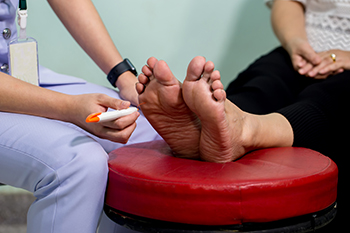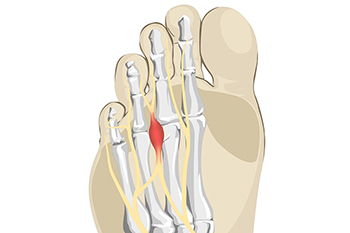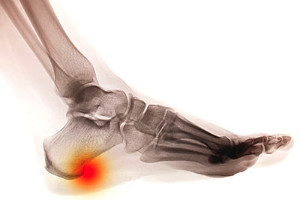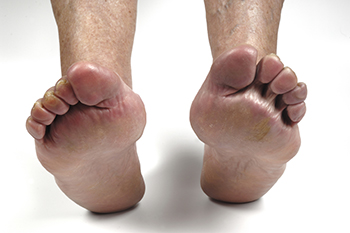Connect With Us
Blog
Items filtered by date: July 2024
Peripheral Neuropathy Affects the Feet

Peripheral neuropathy, which arises from damaged or diseased peripheral nerves, significantly impacts the feet by disrupting the transmission of signals from the brain. Symptoms of peripheral neuropathy can include numbness, tingling, sharp pain, and muscle weakness in the feet. Such symptoms can make everyday activities challenging, and may cause balance issues or foot injuries that are unnoticed due to loss of sensation. The underlying causes of peripheral neuropathy are diverse, with diabetes being a prevalent factor. An early diagnosis and treatment of peripheral neuropathy is vital to manage symptoms and prevent further nerve damage. A podiatrist can perform a thorough exam and order diagnostic tests to develop a comprehensive treatment plan for you. This may include medication or lifestyle modifications to alleviate discomfort and improve mobility. If you have peripheral neuropathy that affects your feet, it is suggested that you schedule an appointment with a podiatrist for an exam and treatment.
Neuropathy
Neuropathy can be a potentially serious condition, especially if it is left undiagnosed. If you have any concerns that you may be experiencing nerve loss in your feet, consult with one of our podiatrists from Comprehensive Foot & Ankle Centers. Our doctors will assess your condition and provide you with quality foot and ankle treatment for neuropathy.
What Is Neuropathy?
Neuropathy is a condition that leads to damage to the nerves in the body. Peripheral neuropathy, or neuropathy that affects your peripheral nervous system, usually occurs in the feet. Neuropathy can be triggered by a number of different causes. Such causes include diabetes, infections, cancers, disorders, and toxic substances.
Symptoms of Neuropathy Include:
- Numbness
- Sensation loss
- Prickling and tingling sensations
- Throbbing, freezing, burning pains
- Muscle weakness
Those with diabetes are at serious risk due to being unable to feel an ulcer on their feet. Diabetics usually also suffer from poor blood circulation. This can lead to the wound not healing, infections occurring, and the limb may have to be amputated.
Treatment
To treat neuropathy in the foot, podiatrists will first diagnose the cause of the neuropathy. Figuring out the underlying cause of the neuropathy will allow the podiatrist to prescribe the best treatment, whether it be caused by diabetes, toxic substance exposure, infection, etc. If the nerve has not died, then it’s possible that sensation may be able to return to the foot.
Pain medication may be issued for pain. Electrical nerve stimulation can be used to stimulate nerves. If the neuropathy is caused from pressure on the nerves, then surgery may be necessary.
If you have any questions, please feel free to contact our offices located in Shepherdsville and Louisville, KY . We offer the newest diagnostic and treatment technologies for all your foot care needs.
Relief From a Sprained Ankle

A sprained ankle occurs when the ligaments that support the ankle joint are stretched or torn, usually due to sudden twists or falls. Symptoms can include pain, swelling, bruising, and difficulty bearing weight on the affected foot. Immediate relief tips for a sprained ankle include rest, compression, and elevation. Resting the ankle prevents further injury, while compression with an elastic bandage helps control swelling, and elevating the ankle above heart level minimizes fluid buildup. If you have sprained your ankle, it is suggested that you promptly schedule an appointment with a podiatrist who can offer treatment methods for this painful condition.
Although ankle sprains are common, they aren’t always minor injuries. If you need your ankle injury looked at, contact one of our podiatrists from Comprehensive Foot & Ankle Centers. Our doctors can provide the care you need to keep you pain-free and on your feet.
How Does an Ankle Sprain Occur?
Ankle sprains are the result of a tear in the ligaments within the ankle. These injuries may happen when you make a rapid shifting movement while your foot is planted. A less common way to sprain your ankle is when your ankle rolls inward while your foot turns outward.
What Are the Symptoms?
- Pain at the sight of the tear
- Bruising/Swelling
- Ankle area is tender to touch
- In severe cases, may hear/feel something tear
- Skin discoloration
Preventing a Sprain
- Wearing appropriate shoes for the occasion
- Stretching before exercises and sports
- Knowing your limits
Treatment of a Sprain
In many cases, the RICE method (Rest, Ice, Compression, and Elevate) is used to treat ankle sprains. However, you should see a podiatrist to see which treatment option would work best with your injury. In severe cases, surgery may be required.
It is important to ask your doctor about rehab options after you receive treatment for your injury. Stretching, strength training, and balance exercises may help the ankle heal while also preventing further injury.
If you have any questions, please feel free to contact our offices located in Shepherdsville and Louisville, KY . We offer the newest diagnostic and treatment technologies for all your foot care needs.
See Your Foot Specialist Regularly If You Work On Your Feet
Definition and Symptoms of Morton’s Neuroma

Morton's neuroma is a painful condition affecting the ball of the foot, commonly between the third and fourth toes. It occurs when the tissue surrounding one of the nerves leading to the toes thickens, causing sharp, burning pain in the ball of the foot. Symptoms often include a sensation of standing on a pebble, tingling, or numbness in the toes. The pain may worsen with activities like walking or wearing tight shoes. Patients often describe a feeling of something being caught in the shoe or a persistent discomfort in the forefoot. Identifying and addressing these symptoms early can help manage the condition and prevent further complications. If you are experiencing any of the above sensations, it is suggested that you confer with a podiatrist who can diagnose and treat Morton’s neuroma.
Morton’s neuroma is a very uncomfortable condition to live with. If you think you have Morton’s neuroma, contact one of our podiatrists of Comprehensive Foot & Ankle Centers. Our doctors will attend to all of your foot care needs and answer any of your related questions.
Morton’s Neuroma
Morton's neuroma is a painful foot condition that commonly affects the areas between the second and third or third and fourth toe, although other areas of the foot are also susceptible. Morton’s neuroma is caused by an inflamed nerve in the foot that is being squeezed and aggravated by surrounding bones.
What Increases the Chances of Having Morton’s Neuroma?
- Ill-fitting high heels or shoes that add pressure to the toe or foot
- Jogging, running or any sport that involves constant impact to the foot
- Flat feet, bunions, and any other foot deformities
Morton’s neuroma is a very treatable condition. Orthotics and shoe inserts can often be used to alleviate the pain on the forefront of the feet. In more severe cases, corticosteroids can also be prescribed. In order to figure out the best treatment for your neuroma, it’s recommended to seek the care of a podiatrist who can diagnose your condition and provide different treatment options.
If you have any questions, please feel free to contact our offices located in Shepherdsville and Louisville, KY . We offer the newest diagnostic and treatment technologies for all your foot care needs.
Causes and Prevention of Heel Spurs

Heel spurs are calcium deposits that develop on the underside of the heel bone, often without causing any discomfort. However, when the plantar fascia ligament, which connects the heel to the toes, undergoes excessive tension or strain, it can become inflamed. This may lead to a condition known as plantar fasciitis, which can cause the heel spur to press into the swollen ligament and cause significant pain. While heel spurs themselves are generally painless, they frequently accompany plantar fasciitis, with about 70 percent of cases showing the presence of a heel spur. Preventative measures include wearing shoes with proper arch support, using heel pads, maintaining a healthy weight, and performing calf stretches before engaging in strenuous activities. A podiatrist can provide a comprehensive treatment plan tailored to your specific needs, which may include custom orthotics, physical therapy, and recommendations for supportive footwear. Surgery may be needed to address severe cases, though it carries risks such as increased pain, nerve damage, and fallen arches. If you are experiencing heel pain, it is suggested that you make an appointment with a podiatrist for an exam and treatment.
Heel spurs can be incredibly painful and sometimes may make you unable to participate in physical activities. To get medical care for your heel spurs, contact one of our podiatrists from Comprehensive Foot & Ankle Centers. Our doctors will do everything possible to treat your condition.
Heels Spurs
Heel spurs are formed by calcium deposits on the back of the foot where the heel is. This can also be caused by small fragments of bone breaking off one section of the foot, attaching onto the back of the foot. Heel spurs can also be bone growth on the back of the foot and may grow in the direction of the arch of the foot.
Older individuals usually suffer from heel spurs and pain sometimes intensifies with age. One of the main condition's spurs are related to is plantar fasciitis.
Pain
The pain associated with spurs is often because of weight placed on the feet. When someone is walking, their entire weight is concentrated on the feet. Bone spurs then have the tendency to affect other bones and tissues around the foot. As the pain continues, the feet will become tender and sensitive over time.
Treatments
There are many ways to treat heel spurs. If one is suffering from heel spurs in conjunction with pain, there are several methods for healing. Medication, surgery, and herbal care are some options.
If you have any questions feel free to contact our offices located in Shepherdsville and Louisville, KY . We offer the latest in diagnostic and treatment technology to meet your needs.
How Can Rheumatoid Arthritis Impact Feet?
 Rheumatoid arthritis, or RA, is an autoimmune disorder where the immune system mistakenly attacks the joints, causing inflammation, pain, and swelling. This condition can significantly affect the feet, leading to discomfort and mobility issues. RA occurs due to a combination of genetic and environmental factors, and it is more common in women and those with a family history of the disease. Symptoms in the feet include persistent pain, swelling, stiffness, and deformities such as bunions and hammertoes. Early diagnosis is important and typically involves physical examinations, imaging tests, and blood tests to identify specific markers. Management of RA in the feet includes medications like anti-inflammatory drugs and disease-modifying antirheumatic drugs to control symptoms and prevent joint damage. Preventive measures involve maintaining a healthy weight, regular exercise, and wearing supportive footwear. In severe cases, surgical interventions may be necessary. If you have symptoms of rheumatoid arthritis in your feet, it is suggested that you schedule regular visits with a podiatrist to monitor and manage your foot health.
Rheumatoid arthritis, or RA, is an autoimmune disorder where the immune system mistakenly attacks the joints, causing inflammation, pain, and swelling. This condition can significantly affect the feet, leading to discomfort and mobility issues. RA occurs due to a combination of genetic and environmental factors, and it is more common in women and those with a family history of the disease. Symptoms in the feet include persistent pain, swelling, stiffness, and deformities such as bunions and hammertoes. Early diagnosis is important and typically involves physical examinations, imaging tests, and blood tests to identify specific markers. Management of RA in the feet includes medications like anti-inflammatory drugs and disease-modifying antirheumatic drugs to control symptoms and prevent joint damage. Preventive measures involve maintaining a healthy weight, regular exercise, and wearing supportive footwear. In severe cases, surgical interventions may be necessary. If you have symptoms of rheumatoid arthritis in your feet, it is suggested that you schedule regular visits with a podiatrist to monitor and manage your foot health.
Arthritis can be a difficult condition to live with. If you are seeking treatment, contact one of our podiatrists from Comprehensive Foot & Ankle Centers. Our doctors can provide the care you need to keep you pain-free and on your feet.
Arthritic Foot Care
Arthritis is a term that is commonly used to describe joint pain. The condition itself can occur to anyone of any age, race, or gender, and there are over 100 types of it. Nevertheless, arthritis is more commonly found in women compared to men, and it is also more prevalent in those who are overweight. The causes of arthritis vary depending on which type of arthritis you have. Osteoarthritis for example, is often caused by injury, while rheumatoid arthritis is caused by a misdirected immune system.
Symptoms
- Swelling
- Pain
- Stiffness
- Decreased Range of Motion
Arthritic symptoms range in severity, and they may come and go. Some symptoms stay the same for several years but could potentially get worse with time. Severe cases of arthritis can prevent its sufferers from performing daily activities and make walking difficult.
Risk Factors
- Occupation – Occupations requiring repetitive knee movements have been linked to osteoarthritis
- Obesity – Excess weight can contribute to osteoarthritis development
- Infection – Microbial agents can infect the joints and trigger arthritis
- Joint Injuries – Damage to joints may lead to osteoarthritis
- Age – Risk increases with age
- Gender –Most types are more common in women
- Genetics – Arthritis can be hereditary
If you suspect your arthritis is affecting your feet, it is crucial that you see a podiatrist immediately. Your doctor will be able to address your specific case and help you decide which treatment method is best for you.
If you have any questions, please feel free to contact our offices located in Shepherdsville and Louisville, KY . We offer the newest diagnostic and treatment technologies for all your foot care needs.
Blog Archives
- July 2025
- June 2025
- May 2025
- April 2025
- March 2025
- February 2025
- January 2025
- December 2024
- November 2024
- October 2024
- September 2024
- August 2024
- July 2024
- June 2024
- May 2024
- April 2024
- March 2024
- February 2024
- January 2024
- December 2023
- November 2023
- October 2023
- September 2023
- August 2023
- July 2023
- June 2023
- May 2023
- April 2023
- March 2023
- February 2023
- January 2023
- December 2022
- November 2022
- October 2022
- September 2022
- August 2022
- July 2022
- June 2022
- May 2022
- April 2022
- March 2022
- February 2022
- January 2022
- December 2021
- November 2021
- October 2021
- September 2021
- August 2021
- July 2021
- June 2021
- May 2021
- April 2021
- February 2021
- January 2021
- December 2020

